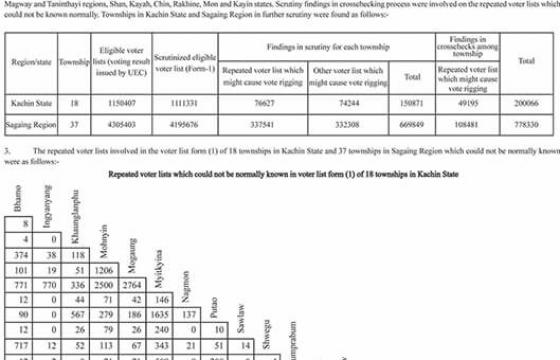If you can keep your head when all about you
Are losing theirs and blaming it on you
Yours is the Earth and everything that’s in it
And-what is more-you’ll be a Man, my son!
Rudyard Kipling (1865-1936)
The peace process: Shwe Ohn’s 6 Ifs
 In December 1992, a month before the National Convention (NC) set up by the military rulers of the country ostensibly to lay down principles for its third constitution, Shan politician U Shwe Ohn (1923-2010) was detained and sentenced to a year’s imprisonment.
In December 1992, a month before the National Convention (NC) set up by the military rulers of the country ostensibly to lay down principles for its third constitution, Shan politician U Shwe Ohn (1923-2010) was detained and sentenced to a year’s imprisonment.
His offense: writing and distributing an essay which made suggestions to the NC about how the new constitution should look like. The 101-page essay titled ‘Toward the Third Union of Burma/Myanmar (When, Why, and How)’, when it came out in a booklet form, published by SHAN, in 1998, was, along with ‘The Village of the Generals’ by TNT, one of the news agency’s ‘bestsellers’.
In it are 6 hypothetical suppositions, which are highly thought provoking.
Also despite the years, it is still very much relevant to what is taking place today under the leadership of U Thein Sein (2011-2016) and Daw Aung San Suu Kyi. (2016 – ).
Perhaps going through them may help today’s leaders to reduce their pride and prejudice. So here they are:
If there were no Aung San…..
Considering the non-Burmans’ sentiments in 1947, it would be hard to imagine that they would have agreed to proposals by any Burman leaders for a union. The reason that they had agreed to was because Burma had a leader like Aung San who was clean, honest, genuinely patriotic, patient and had foresight.
If there were no SSPFL…..
The Shan State People’s Freedom League (SSPFL), set up by Shan youths in 1946, had steadfastly advocated joint independence with the Burmans. It was through its vigorous campaigning that the hesitating ruling princes of Shan States finally gave the go-ahead for the idea.
(Despite its tireless efforts at Shan-Burman friendship and solidarity, the SSPFL was destroyed by the AFPFL government following independence).
If no agreement were not reached at Panglong……
There would be no Frontier Areas Committee of Enquiry (FACE) to sound out the non-Burmans’ wishes. And there would have been no Union of Burma/Myanmar. Instead, Burma Proper, also known as Ministerial Burma, would become independent and the rest remain under British rule.
If the Right of Secession were not provided in the 1947 Constitution……
On 16 June 1947, the Prince of Mongpawn Sao Sam Tun protested that Aung San’s directives for the constitution did not include the non-Burmans’ right of secession, as promised at Panglong. “We think there’s only one thing left for us to do,” he reportedly told U Nu, “and that is to pack our bags and go home.”
The AFPFL leaders, in response, assured him since the principle had been accepted, there should be no lingering doubts. The result was the incorporation of Chapter 10. Right of Secession in the constitution.
It is crystal clear that no Union of Burma/Myanmar would have emerged without it.
If Part ⅡScheduled Areas were not included in Kachin State…..
(Myitkyina and Bhamo districts at that time were designated as Part ⅡScheduled Areas, where the Ministerial Burma government could advise but the final decision rested with the British Government—author’s note)
Without them, there would be no Kachin State and Kachin leadership would have objected. Plans for the formation of a Union would then be in jeopardy.
If there were no Union of Burma/Myanmar……
As said in If #3, Burma and the Frontier Areas would have been separated, with the former becoming independent, and the latter still under British rule. But for how long would that be?
The Federated Malay States, on which the Federated Shan States had modeled itself in 1922, became an independent dominion in the British Commonwealth in 1957. And since 1963, it has become known as Federation of Malaysia.
Similarly, the Frontier Areas would, in all likelihood, become independent by that time. And afterward, probably the Republic of Burma and the independent Frontier Areas will agree to form a Union on equal footing.
No doubt something to chew upon, though the mill never grinds on the water that is past. But it may help to avoid the same mistakes in the future.
Finally, U Shwe Ohn showers all the praises on Aung San, who said on 16 June 1947, with regards to the Panglong Agreement and the FACE recommendations, “We not only accept the letter of the agreement but also the spirit of the agreement.”
He later declared, “I have heard that some ethnic leaders are worried whether we are going to deviate from the spirit of the agreement (in Burmese, he used the words,” “original concept”). What I would like to say here is if they still harbor such doubts, they are insulting both our sense of honor and sense of pride.”
If those words do not epitomize the Spirit of Panglong, what does?






